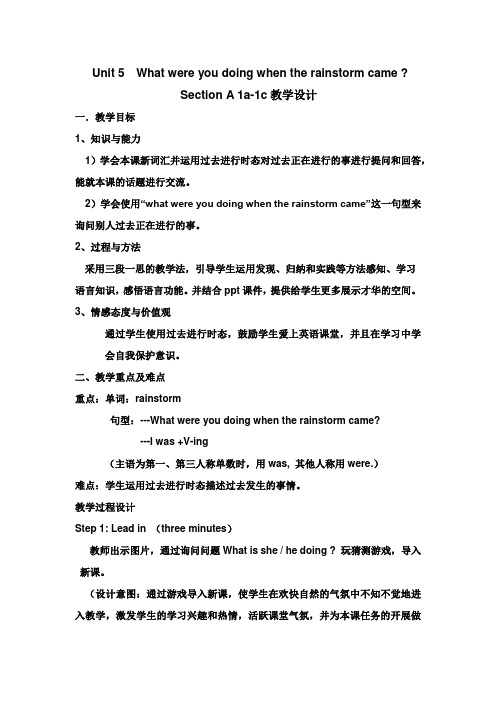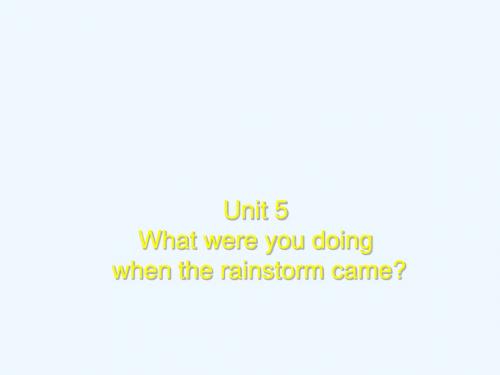山东省肥城市王庄镇初级中学八年级英语下册 Unit 5 What were you doing wh
人教版英语八年级下册Unit5WhatwereyoudoingSectionA(3a3c)说课稿

(一)导入新课
为了快速吸引学生的注意力和兴趣,我计划采用以下方式导入新课:
1.利用多媒体课件展示一张过去某个时间点的照片,如学校运动会现场,让学生观察并描述照片中的人们正在做什么。
2.引导学生思考和讨论:如果这时有人走过来问你正在做什么,你会如何回答?从而引出过去进行时态的概念。
3.通过提问方式激发学生的思考:你们有没有经历过在做什么的时候被别人打扰的情况?当时你是如何回答的?引导学生用过去进行时态进行回答。
(二)教学目标
1.知识与技能:
-学生能够正确运用过去进行时态描述过去某个时间正在进行的动作或状态。
-学生能够理解并运用过去进行时态的常见时间状语。
-学生能够熟练运用过去进行时态进行交际。
2.过程与方法:
-学生通过观察、分析、实践和归纳等方法,掌握过去进行时态的构成和用法。
-学生通过小组讨论、角色扮演等互动活动,提高运用过去进行时态进行交际的能力。
本节课的主要知识点包括:
1.过去进行时态的构成:主语+ was/were +动词-ing。
2.过去进行时态的用法:表示在过去某个时间正在进行的动作或状态。
3.过去进行时态的常见时间状语:-ing形式的动词作时间状语,如:eating, reading等。
4.过去进行时态的肯定句、否定句和疑问句的结构及变化。
3.鼓励学生观察和记录日常生活中的人和事,尝试用过去进行时态进行描述,培养他们的写作和观察能力。
4.设计一些家庭作业,如与家人或朋友进行英语对话,用过去进行时态进行交流,提高他们的口语表达能力。
五、板书设计与教学反思
(Байду номын сангаас)板书设计
我的板书设计将注重清晰性、简洁性和知识结构的呈现。布局上,板书将分为几个部分:标题部分、知识点部分、示例部分和练习部分。标题部分用大号字体突出课程主题;知识点部分用中号字体列出过去进行时态的构成、用法、疑问句和否定句的结构等关键信息;示例部分用小号字体给出具体例子,以便学生直观理解;练习部分则提供一些练习题,帮助学生巩固所学。
八年级英语下册 Unit 5 What were you doing when the rainst

八年级英语下册 Unit 5 What were you doing when the rnstorm came Section B(2a-2e)说课稿(人教新目标版)一. 教材分析人教新目标版八年级英语下册Unit 5 What were you doing when the rnstorm came Section B(2a-2e)的主要内容是讲述过去进行时态在特定时间点发生的动作。
本节课通过引入一个关于雨天的小故事,让学生在情境中学习并运用过去进行时态。
教材通过丰富的语言材料,引导学生运用过去进行时态描述过去某个时间点的动作,从而提高他们的语言运用能力。
二. 学情分析根据八年级学生的认知发展特点,他们对过去进行时态已经有了一定的了解,但可能在实际运用上还存在一定的困难。
因此,在教学过程中,我需要关注学生的个体差异,针对不同学生的学习需求进行有针对性的教学。
同时,通过激发学生的学习兴趣,让他们在轻松愉快的氛围中掌握过去进行时态的运用。
三. 说教学目标1.知识目标:学生能够掌握过去进行时态的结构和用法,能够正确运用过去进行时态描述过去某个时间点的动作。
2.能力目标:学生能够在实际情境中运用过去进行时态进行交流,提高他们的语言运用能力。
3.情感目标:通过本节课的学习,学生能够培养对英语学习的兴趣,增强自信心。
四. 说教学重难点1.教学重点:学生能够掌握过去进行时态的结构和用法,能够正确运用过去进行时态描述过去某个时间点的动作。
2.教学难点:学生能够在实际情境中灵活运用过去进行时态,进行有效的交流。
五. 说教学方法与手段在本节课的教学过程中,我将采用任务型教学法和情境教学法。
通过设计各种形式的任务,让学生在实际操作中学习并运用过去进行时态。
同时,利用多媒体教学手段,如图片、视频等,为学生创设真实生动的情境,帮助他们更好地理解并运用所学知识。
六. 说教学过程1.导入:通过展示一张雨天的图片,引导学生思考他们在雨天会做什么,从而引入本节课的主题。
初中英语人教版八年级下册unit5What were you doing

Unit 5 What were you doing when the rainstorm came ?Section A 1a-1c教学设计一.教学目标1、知识与能力1)学会本课新词汇并运用过去进行时态对过去正在进行的事进行提问和回答,能就本课的话题进行交流。
2)学会使用“what were you doing when the rainstorm came”这一句型来询问别人过去正在进行的事。
2、过程与方法采用三段一思的教学法,引导学生运用发现、归纳和实践等方法感知、学习语言知识,感悟语言功能。
并结合ppt课件,提供给学生更多展示才华的空间。
3、情感态度与价值观通过学生使用过去进行时态,鼓励学生爱上英语课堂,并且在学习中学会自我保护意识。
二、教学重点及难点重点:单词:rainstorm句型:---What were you doing when the rainstorm came?---I was +V-ing(主语为第一、第三人称单数时,用was, 其他人称用were.)难点:学生运用过去进行时态描述过去发生的事情。
教学过程设计Step 1: Lead in (three minutes)教师出示图片,通过询问问题What is she / he doing ? 玩猜测游戏,导入新课。
(设计意图:通过游戏导入新课,使学生在欢快自然的气氛中不知不觉地进入教学,激发学生的学习兴趣和热情,活跃课堂气氛,并为本课任务的开展做热身准备。
简单的日常口语练习,调动了学生的积极性,让学生们都敢于大声说英语,进入英语交际氛围。
)Step 2 : Presentation(20 minutes)1.教师出示男孩踢足球图片,用已学句型询问问题Where is he ? What is he doing ?,利用幻灯片,变化句子中的时间状语,出示本节课新的句型What was he doing ?并引导学生回答He was playing soccer. 出示学生在教室的照片,变化人称练习过去进时--We were reading books at this time yesterday.--He was playing soccer at 8:00 yesterday.在这两组对话中,引导学生总结出过去进行时态的定义和结构,并且用例句巩固语法知识。
八年级英语下册Unit5Whatwereyoudoingwhentherainstormcame单

山东省肥城市潮泉镇八年级英语下册Unit 5 What were you doing when the rainstorm came单词默写周周清(无答案)(新版)人教新目标版编辑整理:尊敬的读者朋友们:这里是精品文档编辑中心,本文档内容是由我和我的同事精心编辑整理后发布的,发布之前我们对文中内容进行仔细校对,但是难免会有疏漏的地方,但是任然希望(山东省肥城市潮泉镇八年级英语下册Unit 5 What were you doing when the rainstorm came单词默写周周清(无答案)(新版)人教新目标版)的内容能够给您的工作和学习带来便利。
同时也真诚的希望收到您的建议和反馈,这将是我们进步的源泉,前进的动力。
本文可编辑可修改,如果觉得对您有帮助请收藏以便随时查阅,最后祝您生活愉快业绩进步,以下为山东省肥城市潮泉镇八年级英语下册Unit 5 What were you doing when the rainstorm came单词默写周周清(无答案)(新版)人教新目标版的全部内容。
Units 5 What were you doing when the rainstorm came?1.暴风雨 n_______ 2。
闹钟 n_________ 3.闹钟发出响声__________4.开始 v _______5.在很大程度上;大量地 adv__________ 6。
突然;忽然 adv_______7.接电话_________8.奇特的;奇怪的 adj________9.暴风雨 n_______10.风 n______11。
光;光线;光亮 n______ 12。
报道;公布 v n_________13地域;地区 n________14。
木;木头 n_________15.窗户 n________16。
手电筒;火炬 n 17。
火柴 n 18。
敲打;打败 v 19。
倚;碰;撞 prep 20。
初中英语人教版八年级下册Unit 5 What were you doing

Section A 3 Grammar focus - 4c
When I …
He was doing …
When I called him up, he was sleeping.
While I …
1. —Miss Lin ______ my desk-mate with her lessons when I left school. —She is really a nice teacher. A. helps B. is helping C. was helping (2015 福建福州)
③ While I was sleeping in the bedroom, someone knocked at the door. ④ David fell while he was riding his bike. 主句的动作是短暂性的,从句的动 作是持续性的,此时用_______ while 引导 从句,主句用__________ 一般过去 时态,从 句用过去进行时态。
What were you doing at these 4c times last Sunday? Fill in the chart. Then ask your partner.
A: What were you doing at nine o’clock last Sunday morning? B: I was sleeping. How about you? A: I was doing my homework. B: You’re kidding!
⑤ While Andy was waiting for the bus, he was reading a newspaper. ⑥ He was cleaning his car while I was cooking. 主句和从句的动作在过去的某时刻或某 段时间同时发生, 而且动作都是持续性 的, 此时用_______ while 引导从句, 而且主句 和从句都用_________ 过去进行 时态。
山东省肥城市王庄镇初级中学八年级英语下册 Unit 5 What were you doing whentherainstorm came导学案(无

Unit5 What were you doing when the rainstorm came?(总第九课时)SectionA1a-2d【学习目标】:1、能会背本课的rainstorm, at the time of.学习了解过去进行时的构成及用法2、能正确的使when 与at the time of引导的时间状语从句初步交谈过去进行的事。
如:(1) Where were you when the rainstorm came? —I was in the library.(2)What were you doing at the time of the rainstorm? —I was studying.3、学习策略:学会通过看提示预测问题的答案。
4、通过和同学合作对话,了解彼此过去正在进行的生活,促使学生积极参与英语实践活动。
【学习重、难点】:1.学习,掌握单词,词汇,短语并灵活运用.2. 能初步交谈过去进行的事学习了解过去进行时的构成及用法。
【自学检测】:1、根据下列汉语提示的单词短语识记并默写。
暴风雨_____ 在….的时候_____ 走回家_____等公车_____ 做我的家庭作业_____ 去上班 _____闹钟_______ 开始_______ 突然_______ 奇怪的_______(闹钟)发出的响声______________ 接电话______________2.仔细观察下面的对话,用“_____”标出对话中所出现的时间,并补全句子.(1) A: What are you doing now? B: I am doing my homework now. They are having an English lesson.(2) A: What were you doing at 9 o’clock last night? B: I was doing homework. C:_________________________________(我正在打扫我的房间).(3) A: What were you doing when your mother came back yesterday?B:I ______________________________________(我正在做作业).【点拨】:过去进行时过去进行时主要表示在_____或_____进行的动作。
八年级英语下册 Unit 5 What were you doing when the rainst

flashlights and radio were working. She also put some candles and matches on the table. Ben was helping his mom make dinner when the rain began to beat heavily against the windows. After dinner, they tried to play a card game, but it was hard to have fun with a serious storm happening outside.
3
I _w__a_s_w_a_i_t_in_g_ for the bus when it began to rain heavily.
4
I _w__a_s_ so busy l_o_o_k_i_n_g for the umbrella that I didn’t see a car coming.
TV reporter: Tell us what happened yesterday morning.
Boy: … TV reporter: So, when the rainstorm suddenly
came, what were you doing? Boy: …
2d. Role-role the conversation.
5
I took a hot shower and ___a_te_______ some warm food.
山东省肥城市潮泉镇八年级英语下册 Unit 5 What were you doing when t

Units 5 What were you doing when the rainstorm came?
1.暴风雨 n_______
2.闹钟 n_________
3.闹钟发出响声__________
4.开始 v _______
5.在很大程度上;大量地 adv__________
6.突然;忽然 adv_______
7.接电话_________
8.奇特的;奇怪的 adj________9.暴风雨 n_______10.风 n______11.光;光线;光亮 n______
12.报道;公布 v n_________13地域;地区 n________14.木;木头 n_________
15.窗户 n________16.手电筒;火炬 n 17.火柴 n 18.敲打;打败 v
19.倚;碰;撞 prep 20.睡着 adj 21.进入梦乡;睡着 _________
22.逐渐变弱;逐渐消失 _______23.升起;增加;提高 v n ___________
24.倒下的;落下的 adj 25.分离;分开adv 26.看一看 _________
27.覆盖着冰的;冰冷的 adj 28.开玩笑;欺骗 v 29.理解;领会;认识到 v
30.前往;费力地前进 ______________ 31.章节;段落 n 32.学生 n
33.彻底地;完全地 adv _____34.惊愕的;受震惊的 adj 35.沉默;缄默;无声 n 36.沉默;无声 __________37.不久前;最近 adv ____________
38.拆除;往下拽;记录 39.恐怖主义者;恐怖分子 n 40.日期;日子n
41.塔;塔楼 n 42. 首先;最初 43.实情;事实 n
1。
- 1、下载文档前请自行甄别文档内容的完整性,平台不提供额外的编辑、内容补充、找答案等附加服务。
- 2、"仅部分预览"的文档,不可在线预览部分如存在完整性等问题,可反馈申请退款(可完整预览的文档不适用该条件!)。
- 3、如文档侵犯您的权益,请联系客服反馈,我们会尽快为您处理(人工客服工作时间:9:00-18:30)。
Unit5 What were you doing when the rainstorm came?
SectionA1a-2d
【学习目标】:
1、能会背本课的rainstorm, at the time of.学习了解过去进行时的构成及用法
2、能正确的使when 与at the time of引导的时间状语从句初步交谈过去进行的事。
如:
(1) Where were you when the rainstorm came? —I was in the library.
(2)What were you doing at the time of the rainstorm? —I was studying.
3、学习策略:学会通过看提示预测问题的答案。
4、通过和同学合作对话,了解彼此过去正在进行的生活,促使学生积极参与英语实践活动。
【学习重、难点】:
1.学习,掌握单词,词汇,短语并灵活运用.
2. 能初步交谈过去进行的事学习了解过去进行时的构成及用法。
【自学检测】:
1、根据下列汉语提示的单词短语识记并默写。
暴风雨_____ 在….的时候_____ 走回家_____
等公车_____ 做我的家庭作业_____ 去上班 _____
闹钟_______ 开始_______ 突然_______ 奇怪的_______
(闹钟)发出的响声______________ 接电话______________
2.仔细观察下面的对话,用“_____”标出对话中所出现的时间,并补全句子.
(1) A: What are you doing now? B: I am doing my homework now. They are having an English lesson. (2) A: What were you doing at 9 o’clock last night? B: I was doing homewo rk.
C:_________________________________(我正在打扫我的房间).
(3) A: What were you doing when your mother came back yesterday?
B:I ______________________________________(我正在做作业).
【点拨】:
过去进行时
过去进行时主要表示在_____或_____进行的动作。
其构成为_____。
常与at that time, this time yesterday, all the evening, from 8:00 to 10:00yesterday, just then, at nine yester day, when 等表示明确有具体的时间状语。
eg:(1)I was doing my homework at this time yesterday.
(2)What was Tom doing at ten yesterday.
(3)I was eating dinner when the phone rang.
其具体的句型为:肯定句:主语+_______+其他。
eg:They were having a meeting that time. 否定句:主语+_______+其他。
eg:They weren’t having a meeting that time.
一般疑问句________+主语+______+其他?
肯定回答:Yes,主语+was/w ere. 否定回答:No,主语+wasn’t/weren’t.
eg:Were they having a meeting that time? Yes, they _____. No, they _____.
【当堂训练】:
1.昨天晚上8:30我正在看电视。
_______________________________________.
2.当我妈妈回来时我正在做作业。
_______________________________________.
3.正当我在打扫房间时电话响了。
_______________________________________.
4. The boy was walking home when the rainstorm came. —————————————————————————
首字母填空
(1)Hurry up,or you wil l m_____ the bus.
(2)She began to play the piano w_____ she was five years old. (3)He has so m_____ friends.
(4)Tom rushed into the house w_____ his mother was cooking. (5)I s_____ remembered that I didn’t bring my key.。
